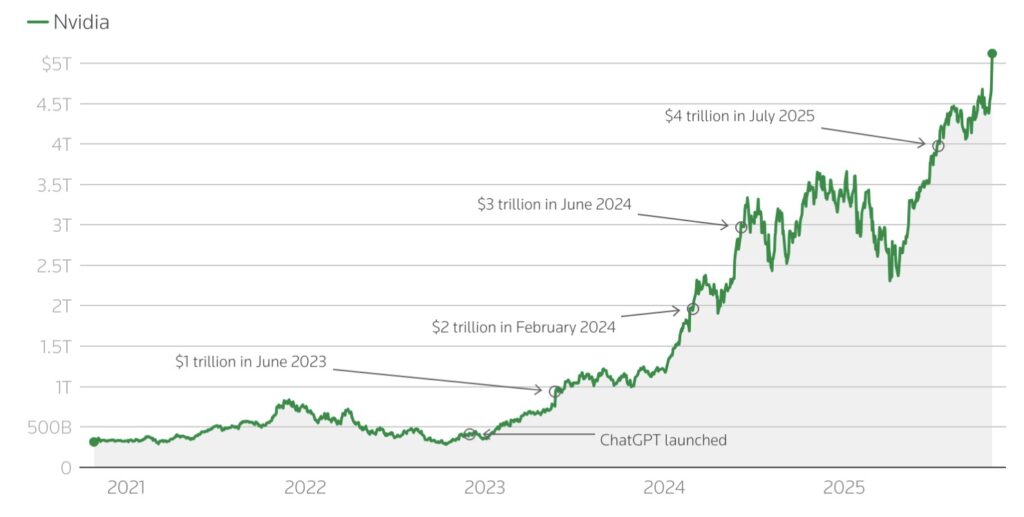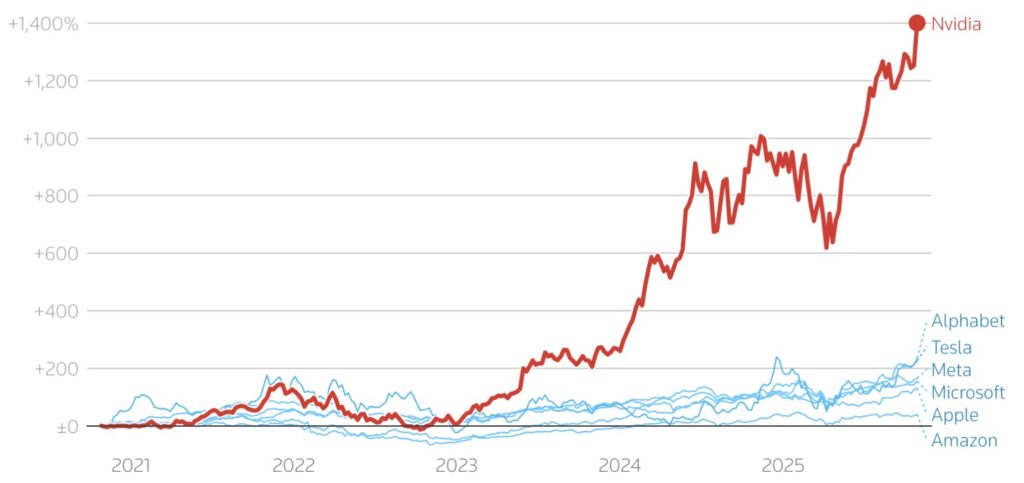From Silicon Valley Underdog to Global Tech Titan, Nvidia’s Rise Reshapes Industries and Geopolitics
- AI-Powered Valuation Milestone: Nvidia becomes the first company to hit a $5 trillion market cap, driven by explosive demand for its AI chips amid the global artificial intelligence boom.
- Leadership and Innovation Edge: CEO Jensen Huang’s strategic announcements, including $500 billion in chip orders and U.S. government supercomputers, solidify Nvidia’s position as the backbone of AI technology.
- Geopolitical and Economic Implications: The company’s dominance sparks U.S.-China tech rivalries, boosts Huang’s personal fortune, and raises questions about market bubbles while influencing global stock indices.
In the ever-evolving landscape of technology, few stories capture the imagination quite like Nvidia‘s ascent to a staggering $5 trillion market valuation. On Wednesday, the Santa Clara-based chipmaker etched its name in Wall Street history as the first company to achieve this feat, surpassing even the total value of the entire cryptocurrency market. This milestone isn’t just a number—it’s a testament to how artificial intelligence has transformed Nvidia from a specialized graphics processor designer into the indispensable engine of the AI era. Since the launch of ChatGPT in 2022, Nvidia’s shares have skyrocketed 12-fold, propelling the S&P 500 to record highs and igniting debates about whether this tech frenzy signals the next big market bubble.

At the heart of this meteoric rise is Nvidia’s CEO, Jensen Huang, whose visionary leadership has turned the company he founded in 1993 into a Silicon Valley powerhouse. Born in Taiwan and raised in the U.S. from the age of nine, Huang has steered Nvidia through decades of innovation, evolving it from niche gaming hardware to the core of AI infrastructure. His recent announcements have only amplified investor enthusiasm: on Tuesday, Huang revealed $500 billion in AI chip orders and plans to build seven supercomputers for the U.S. government. These moves not only underscore Nvidia’s technological prowess but also highlight its role in national security and economic strategy. Shares closed the day up 3% at $207.04, pushing the company’s market value to $5.03 trillion—just three months after breaching the $4 trillion mark.
This surge has catapulted Huang into the ranks of the ultra-wealthy, with his stake in Nvidia now valued at approximately $179.2 billion, making him the world’s eighth-richest person according to Forbes. Under his guidance, Nvidia’s H100 and Blackwell processors have become the go-to hardware for powering large-language models behind revolutionary tools like ChatGPT and Elon Musk’s xAI. As Matt Britzman, a senior equity analyst at Hargreaves Lansdown, aptly put it, “Nvidia hitting a $5 trillion market cap is more than a milestone; it’s a statement, as Nvidia has gone from chip maker to industry creator.” Britzman’s firm holds shares in Nvidia, reflecting widespread confidence in the company’s ability to capitalize on the AI opportunity, which many believe the market still underestimates.
Yet, Nvidia’s dominance extends far beyond financial metrics, weaving into the fabric of global geopolitics. The company’s advanced chips have become a flashpoint in the U.S.-China tech rivalry, with Washington’s export controls restricting sales of high-end processors like the Blackwell to limit China’s AI advancements. President Donald Trump is slated to discuss these very chips with Chinese President Xi Jinping on Thursday, highlighting Nvidia’s role as a bargaining chip in international relations. At Nvidia’s developer conference, Huang navigated this tightrope skillfully, praising Trump’s “America First” policies for boosting domestic tech investment while cautioning that excluding China could deprive the U.S. of access to half the world’s AI developers. As Bob O’Donnell of TECHnalysis Research noted, “Nvidia clearly brought their story to D.C. to both educate and gain favor with the U.S. government,” touching on the hottest topics in tech.

From a broader perspective, Nvidia’s story mirrors the explosive growth of the AI industry itself, where unrelenting spending by Big Tech giants like Apple and Microsoft—both of which have recently hit $4 trillion valuations—fuels a self-reinforcing cycle. These companies rely on Nvidia’s chips to build out AI capabilities, creating a “flywheel” effect that drives further innovation and investment. However, not everyone is optimistic. Analysts like Matthew Tuttle of Tuttle Capital Management warn that “AI’s current expansion relies on a few dominant players financing each other’s capacity. The moment investors start demanding cash-flow returns instead of capacity announcements, some of these flywheels could seize.” This cautionary note echoes concerns about overinflated valuations, especially as tech heavyweights dominate indices like the S&P 500 and Nasdaq 100, exerting outsized influence on global markets.
Competition is heating up, with rivals such as Advanced Micro Devices (AMD) and well-funded startups vying to chip away at Nvidia’s lead in high-end AI hardware. Despite these challenges, Nvidia remains the industry’s top choice, its products integral to everything from generative AI tools to supercomputing projects. Regulatory scrutiny is intensifying worldwide, as governments grapple with the implications of such concentrated power in AI technology. In the U.S., Nvidia’s partnerships with the government position it as a key player in advancing national AI capabilities, while internationally, its ecosystem influences developers across borders.
Nvidia’s $5 trillion milestone isn’t just about one company’s success—it’s a snapshot of a transformative era where AI is reshaping economies, politics, and innovation. As the world races to harness this technology, Nvidia stands at the forefront, proving that in the AI boom, the real winners are those who build the tools everyone else needs. Whether this rally sustains or faces headwinds, one thing is clear: Nvidia has redefined what it means to be a tech titan in the 21st century.
